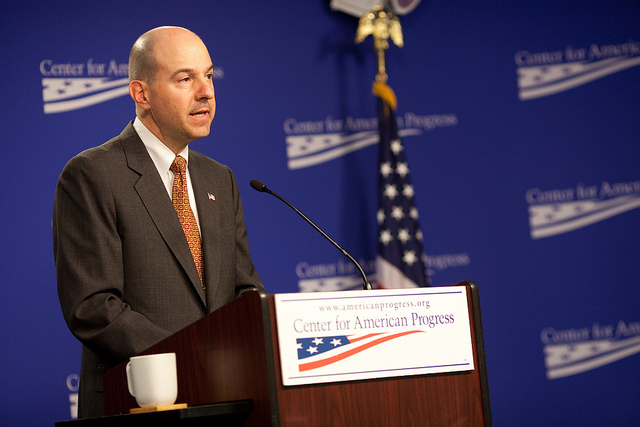More fraud and abuse in the monopolies-granting bodies that large corporations are utilising

Photo credit: Center for American Progress
Summary: Corruption is found at the heart of the USPTO and the USPTO works hard to hide it, despite attempt by whistleblowers to bring this corruption to light
OVER the years we have covered many issues and scandals in the USPTO. Not only the copyright system is rigged (managed by and serving the large copyright monopolies); the USPTO is more or less the same. It is a government body that is run by corporations and their minions (like David Kappos). Some months ago we showed that the USPTO was approving 92% of all applications, which makes it little more than a rubber-stamping establishment.
Well, how can it be that so much prior art and triviality got overlooked by the Kappos-run USPTO?
Perhaps now we know.
"For quite some time now, we've discussed how the USPTO had a massive backlog," says Mike Masnick, "and that former boss David Kappos solved this "problem" by getting examiners to approve more patents faster, mainly by lowering their standards and granting more patents."
"Whenever we write about this, we hear about overworked patent examiners who are really trying their best. Except, it appears that the system is actually rife with abuse and fraud by patent examiners,"
Masnick added, linking to
a highly-cited report.
To quote the report: "Prompted by multiple whistleblower complaints, the U.S. Patent and Trademark Office began an internal investigation two years ago of an award-winning program that’s been praised in and outside government: Employees are allowed to work from home.
"What the inquiry uncovered was alarming.
"Some of the 8,300 patent examiners, about half of whom work from home full time, repeatedly lied about the hours they were putting in, and many were receiving bonuses for work they didn’t do. And when supervisors had evidence of fraud and asked to have the employee’s computer records pulled, they were rebuffed by top agency officials, ensuring that few cheaters were disciplined, investigators found."
Here again we see whistleblowers in action and
cover-up attempts by the USPTO.
The attempted cover-up attempts show that rather than deal with the abuses the USPTO became very much complicit. Perhaps it's time to shut down the USPTO in its current form and annul all the patents approved in the past few years, revising and reviewing them as they may never have been reviewed at all, just blindly approved. To quote Masnick: "So, we just wrote about the fact that there was apparently fairly widespread abuse and fraud by patent examiners, mostly those working from home, in lying about the hours they put in and getting paid for work they didn't do. However, what may be much more concerning was the fact that the USPTO tried to hide this from the Inspector General who was investigating this. As the Washington Post notes, an initial internal report detailed many more examples of fraud and abuse, which disappeared from the final report that was handed over. "
The whistleblowers at the USPTO deserve some credit and they remind us
the importance of whistleblowers, who
so often rely on Free software.
The
CCIA's Matt Levy now admits in his belated disclosure that "my wife is a patent examiner who teleworks." Teleworking has been the source of abuse, but Levy keeps chastising
"The PTO’s Culture of Poor Quality Patents" rather than corruption.
"The problem," he says, "is not simply a bunch of crooked people trying to get away with something. There is clearly a cultural problem at the USPTO."
No, the problem is that the USPTO -- just like CCIA -- is serving corporations. It does not serve public interests. Patent scope is one of the symptoms.
We currently talk to someone who wishes to blow the whistle on the EPO but it trying to set up encryption. It is clear that the NSA and its partners in Europe have done a lot to deter whistleblowers.
⬆

